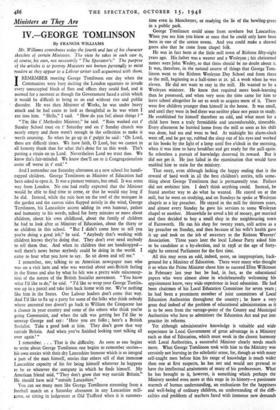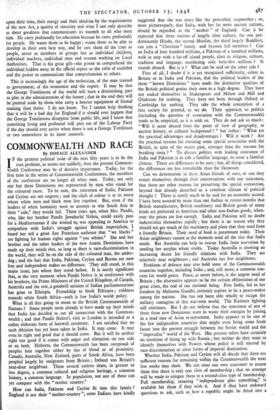Ministers as They Are
IV.-GEORGE TOMLINSON
By FRANCIS WILLIAMS Mr. Williams contributes today the fourth and last of his character sketches of certain Ministers. The view he takes in each case is, of course, his own, not necessarily " The Spectator's." The purpose of the articles is to portray Ministers not known personally to most readers as they appear to a Labour writer well acquainted with them.
IREMEMBER meeting George Tomlinson one day when the Communists were busy inciting the London squatters to invade every unoccupied block of flats and offices they could find, and it seemed for a moment as though the Government faced a crisis which it would be difficult to bring to an end without riot and public disorder. He was then Minister of Works, he was under heavy attack and he had cause to look as thoughtful as he was when I ran into him. " Hello," I said. " How do you feel about things ? "
" I'm like t' Methodist Minister," he said. " Rain washed out t' Sunday School treat on t' Saturday and on t' Sunday church was nearly empty and there wasn't enough in the collection to make it worth counting. So when he go up in t' pulpit he said : Oh Lord, these are difficult times. We have faith, 0 Lord, but we cannot in all honesty thank thee for what tha's done for us this week. Tha's putting a strain on us Lord. Nevertheless Lord we trust thee. We know tha's fair-minded. We know thee'll see to it Congregationalists come off worse in t' end.' " And I remember one Saturday afternoon at a new school for handi- capped children. George Tomlinson as Minister of Education had been asked to open it. It was a pioneer venture, but small. It was some way from London. No one had really expected that the Minister would be able to find time to come, or that he would stay long if he did. Instead, while the rain beat on the roof of the marquee in the garden and the canvas sides flapped noisily in the wind, George Tomlinson, his Lancashire accent adding its own humour, pathos and humanity to his words, talked for forty minutes or more about children, about his own childhood, about the family of children he had to look after as Minister of Education, about the thirty or so children in this school. " But I didn't come here to tell you you're doing a good job," he said. " Anybody that's working with children knows they're doing that. They don't ever need anybody to tell them that. And when its children that are handicapped— well there's nowt better anybody could be doing in the world. I came to hear what you have to say. So sit down and tell me."
I remember, too, talking to an American newspaper man who was on a visit here and who was worried about anti-British feeling in the States and also by what he felt was a pretty wide misconcep- tion of the nature of the British Socialist movement. " You know what I'd like to do," he said. " I'd like to wrap your George Tomlin- son up in a parcel and take him back home with me. We've nothing like him in the States. Our Labour leaders don't come that way. And I'd like to fix up a party for some of the folks who think nobody whose ancestral tree doesn't go back to William the Conqueror has a chance in your country and some of the others who think you're going Communist, and when the talk was getting hot I'd like to unwrap George and say : ' Here you are folks ; here's a British Socialist. Take a good look at him. They don't grow that way outside Britain. And when you've finished looking start talking all over again.' "
I remember. . . . That is the difficulty. As soon as one begins to write about George Tomlinson one begins to remember stories— his own stories with their dry Lancashire humour which is so integral a part of the man himself, stories that others tell of that immense Lancashire capacity of his for being himself wherever he happens to be or whatever the company in which he finds himself. My American friend said, "They don't grow that way outside Britain." He should have said "outside Lancashire."
You can see many men like George Tomlinson streaming from a football match on a Saturday afternoon in any Lancashire mill- town, or sitting in judgement at Old Trafford when it is summer- time even in Manchester, or studying the lie of the bowling-greet in a public park.
George Tomlinson could come from nowhere but Lancashire. When you see him you know at once that he could only have been born in one of the cotton towns. And you could make a shrewd guess also that he came from chapel folk.
He was in fact born at the little mill town of Rishton fifty-eight years ago. His father was a weaver and a Wesleyan ; his christened names were John Wesley, so that there should be no doubt about it. It was, therefore, in the natural course of things that George Tom- linson went to the Rishton Wesleyan Day School and from there to the mill, beginning as a half-timer at 2s. 3d. a week when he was eleven. He did not want to stay in the mill. He wanted to be a Wesleyan minister. He knew that required more book-learning than he possessed, and when very soon the time came for him to leave school altogether he set to work to acquire more of it. There were five children younger than himself in the house. It was small, and until they were in bed there was neither place nor peace to study. He established for himself therefore an odd, and what must for a child have been a truly formidable and uncomfortable, timetable. Every afternoon he hurried home from the mill as soon as his shift was done, had tea and went to bed. At midnight his alarm-clock went off, and he got up, rubbed the sleep out of his eyes and worked at his books by the light of a lamp until five o'clock in the morning, when it-was time to have breakfast and get ready for the mill again. So relentless a pursuit of knowledge deserved its reward. But it did not get it. He just failed in the examination that would have enabled him to train for the ministry.
That story, even although lacking the happy ending that is the reward of hard work in all the best children's stories, tells some- thing about George Tomlinson that is permanently true. Failure did not embitter him. I don't think anything could. Instead, he found another way to do what he wanted. He stayed on at the mill, but he went on studying, and on Sundays he spoke at Wesleyan chapels as a lay preacher. He stayed in the mill for thirteen years, and almost every Sunday he gave his services to some Wesleyan chapel or another. Meanwhile he saved a bit of money, got married and then decided to buy a small shop in the neighbouring town of Farnworth. He ran his shop for twenty years, still active as a lay preacher on Sunday, and then because of his wife's health gave it up and took on the job of secretary to the Rishton Weavers' Association. Three years later the local Labour Party asked him to be candidate at a by-election, and in 1938 at the age of forty- eight he entered Parliament for the first time.
All this may seem an odd, indeed, more, an inappropriate, back- ground for a Minister of Education. There were many who thought it so when the Prime Minister chose him to succeed Ellen Wilkinson in February last year but he had, in fact, as the educational papers who were almost alone in wholeheartedly welcoming his appointment knew, very wide experience in local education. He had been chairman of his Local Education Committee for seven years ; he had been a prominent member of joint committees of Local Education Authorities throughout the country ; he knew a very great deal indeed of the problem of educational administration as it is to be seen from the vantage-point of the County and Municipal Authorities who have to administer the Education Act and put intc practice its reforms.
Yet although administrative knowledge is valuable and wide experience in Local Government of great advantage in a Ministry such as that of Education, which must work in the closest harmony with Local Authorities, a successful Minister clearly needs much more. What George Tomlinson took with him to the Ministry was certainly not learning in the scholastic sense, for, though as with many self-taught men before him his range of knowledge is much wider than one at first suspects, he has not and would not pretend to have the intellectual attainments of many of his predecessors. What he has brought to it, however, is something which perhaps the Ministry needed even more at this stage in its history—a passionate warmth of human understanding, an enthusiasm for the happiness and well-being of ordinary children, an understanding of the diffi- culties and pioblerds of teachers faced with immense new demands upon their time, their energy and their idealisin by the requirements of the new Act, a quality of sincerity and what I can only describe as sheer goodness that communicates its warmth to all who meet him. He cares profoundly for education because he cares profoundly for people. He wants them to be happy ; wants them to be able to develop in their own best way, and he sees them all the time as people, never as numbers or groups but as individual children, individual teachers, individual men and women working on Local Authorities. That is his great gift—the power to comprehend the individual hidden away in the official report or the table of statistics and the power to communicate that comprehension to others.
This is increasingly the age of the technician, of the man trained to government, of the economist and the expert. It may be that the George Tomlinsons of the world will have a diminishing part to play in the administration of the future ; that in the end they will be pushed aside by those who carry a heavier equipment of formal training than theirs. I do not know. Yet I cannot help thinking that it will be a bad day for England if it should ever happen that the George Tomlinsons disappear from public life, and I know that something living and profound will pass out of the Labour Party if the day should ever arrive when there is not a George Tomlinson or two somewhere in its inner counsels.



































 Previous page
Previous page